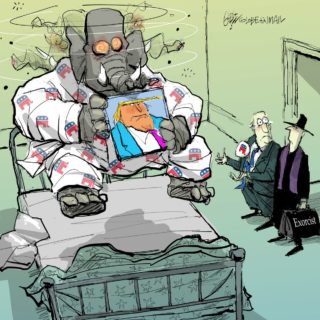With alcohol flowing and nationalism running high, thousands of Crimeans gathered under a massive statue of Vladimir Lenin on Sunday to celebrate the fact they will likely soon be Russians.
The consequences of Crimea’s referendum – in which upwards of 95 per cent of voters backed union with Russia, according to official figures – are massive, deepening the long and violent crisis in Ukraine and pushing relations between Moscow and the West further toward the lows of the Cold War.
But for many of those celebrating in downtown Simferopol, it was a simple matter of righting a historic mistake.
“I was born here in 1953, [when] Crimea was still Russian,” said retiree Evgeniya Kharitonova, referring to Nikita Khrushchev’s 1954 decision to transfer Crimea to what was then Soviet Ukraine, a move that left Crimea outside Russia’s borders when the USSR collapsed in 1991. “We’ve waited 60 years to be back together with Russia.”
The crowd around her chanted “Russia! Russia!” and waved Russian and Crimean flags, alongside the black-and-orange banner of Russian army veterans.
Reflecting the jingoistic mood, others in the crowd carried the flag of the Liberal Democratic Party of Russia, a Kremlin-sponsored far-right movement headed by Vladimir Zhirinovsky.
“Everything in Ukraine is getting worse. I don’t want to live with the nationalists,” said 20-year-old Anton Dadeyev, a university student who carried a blue-and-yellow LDPR banner. “Now everything will be better.”
Russia’s parliament, the Duma, is expected this week to pass legislation to legalize the annexation of Crimea, which will mark the first time Russia has expanded its borders since the end of the Second World War. The ruble is expected to replace the Ukrainian hryvnya as the official currency here within a matter of days.
Those who voted here on Sunday say that is exactly what they want.
There’s deep anger in Crimea over the revolution in Kiev, whose uprising has been portrayed on Russian television channels as a Western-financed coup d’état involving radicals with an anti-Russian agenda.
“All the things that are happening in Ukraine, we don’t want them to happen here …it’s chaos. Absolutely outrageous,” said Irina Shapovalenko, a 30-year-old civil servant who cast her ballot in a chemistry classroom in central Simferopol. Plus, she said Russia had a better standard of living than Ukraine, which – on top of all its other problems – is on the brink of economic disaster.
Similar sentiments were repeated by every voter The Globe and Mail interviewed on Sunday. Of the dozens of marked ballots that could be viewed inside transparent ballot boxes, every single visible vote was marked in favour of union with Russia.
(The referendum was not a yes-or-no affair. Voters were asked to choose either union with Russia, or a return to Crimea’s 1992 constitution, which asserted the region’s autonomy from Ukraine.)
The referendum was carried out in the presence of what the Ukrainian government says are almost 22,000 Russian troops on the peninsula. Heavily armed and supported by armoured vehicles, balaclava-clad fighters have surrounded the Ukrainian military in their bases, making much of the peninsula feel as though it’s under military occupation.
Russian President Vladimir Putin has provoked ridicule by suggesting the well-trained gunmen are local militiamen, rather than Russian soldiers. The well-trained troops wear no insignia, but they are supported by vehicles with Russian licence plates.
There were also few foreign observers here for the vote, as the Organization for Security and Co-operation in Europe, which monitors most votes on the continent, stayed away at Kiev’s request.
“I would say this election doesn’t seem to be less legitimate than the elections in Ukraine before,” said Johannes Hubner, an Austrian parliamentarian from that country’s far-right Freedom Party, who travelled to Crimea at the invitation of the Crimean government. “We see no signs of intimidation, no signs of a breach of security. We have seen Cossacks and militias standing around polling stations, but no one interferes.”
More controversial than the overwhelming result will be the government’s assertion that more than 80 per cent of Ukrainians voted, defying calls from the government in Kiev, as well as key leaders of the Crimean Tatar community, to boycott the vote.
Turnout appeared to be very low in areas populated by Crimean Tatars, a Muslim community that makes up about 12 per cent of the region’s population. Many Crimean Tatars fear a return to Russian control after two centuries of violent persecution under first Czarist and then Soviet rule.
“We’re not interested in this referendum. Nobody consulted the Crimean Tatars. We are the indigenous people here. We should have been consulted,” said Mustafa Mustafayef, a 58-year-old member of the local council in the predominantly Tatar city of Bakhchysarai. “What’s happening right now is aggression and occupation. They just took down one flag and put up another.”
MARK MACKINNON
SIMFEROPOL, UKRAINE — The Globe and Mail
Published Sunday, Mar. 16 2014, 9:54 PM EDT
Last updated Monday, Mar. 17 2014, 6:32 AM EDT

